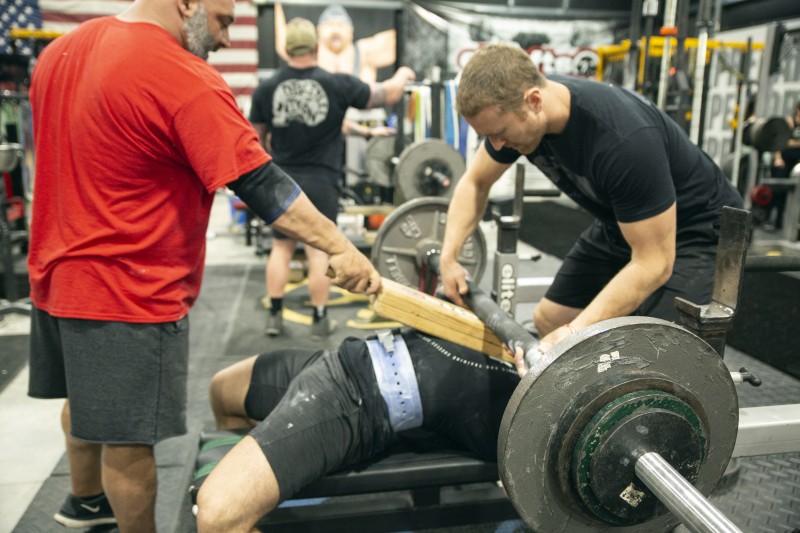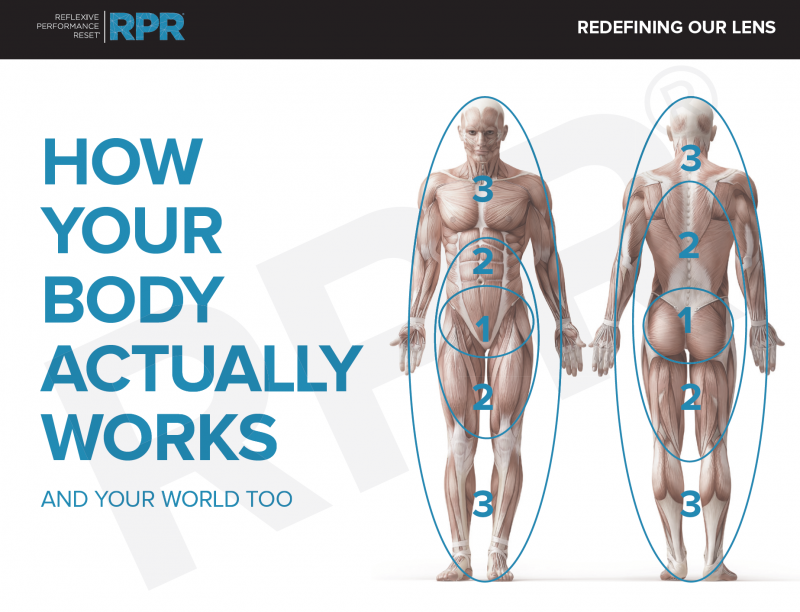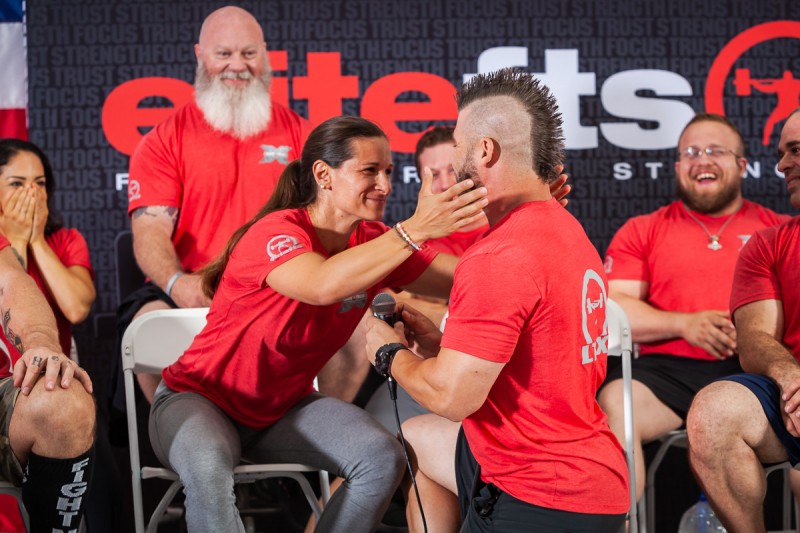
A month ago, I got to catch up with a friend who works as a strength and conditioning coach within collegiate athletics. I got together with him and one of his staff members to do some shooting, talk shop, and compete a bit.
We got to talking about the message that the head coach established for the upcoming season and the challenge the message brought with it. The message was simple – toughness. What does it mean to be tough? What does it take to be tough? Are you tough?
RECENT: Under the Baa-r: Lessons Learned in Herding, From Me to Ewe
Now, when you think of tough, you probably imagine the bar scene in The Terminator when the biker puts out a cigar on Arnold Schwarzenegger’s chest without him even flinching, the UFC fighter who finishes a fight with a broken nose, working long hours at a job, or waking up early every day.
How about toughness in training? You might say toughness is attacking every training session, doing an extra repetition, performing a drop set or occlusion set, or training through an injury.
So, is this the message the old ball coach was preaching to his team? To show up with energy and aggression at practice, in training, and during competition? To establish dominance on the opponent from the first snap and then bury them in the fourth quarter? No. Not even close.
The mainstream brand of toughness that we are most familiar with is really not that hard to reproduce. Furthermore, true toughness is a characteristic many talk about but few execute. It’s easy to raise four fingers at the end of the third quarter. It’s easy to take a punch, hold back your emotions, or speak your mind. In fact, many people would rather be punched in the face than execute certain defining instances of toughness. Working long hours could be an indication that you’re not productive enough. Waking up earlier is accomplished simply by going to bed earlier.
So, what does it mean to be tough? Let’s find out.

Razvan Chisu © 123rf.com
Football
For an 18- to 22-year-old college athlete, toughness means eating when you’re supposed to, going to bed to ensure you are rested and recovered instead of hanging out with friends, being on time to team events, and being a representative of your team at all times. It means going to class instead of sleeping in or playing video games and doing the work to get an education and staying eligible. It also means preparing your body to perform. Show up for treatment every day. Stay hydrated. Watch more films. Focus on your job. Finally, it means influencing OTHERS around you to do the same. Football is the ultimate team sport. Eleven players must be on the same page on each play. Success is heavily reliant on the leaders’ ability to have the mental toughness to adopt a particular standard, and then hold themselves and everyone else around them to that standard. These are the actions of champions and the message that this particular coach was preaching.
So what about us? Can we expand on this message to evaluate our own toughness? Absolutely. In fact, just as in the above examples, many opportunities exist to display mental toughness and mental fortitude things in our everyday life.
Training
Training provides a challenging atmosphere for lifters, regardless of experience. What does it mean to be tough in training? In my experience, the reason for problems in one’s training is usually internal, and often the biggest indicator of toughness in training is simply the ability to keep yourself in check.
WATCH: Joe Sullivan Rants — Go to Therapy!
One of the best ways to do this is to have a plan. Creating a plan requires you to be honest with yourself. Where are you, where do you want to be, how will you get there, and how long do you expect it to take? It also forces you to ask the very important question – Do I need help? Having a plan forces you to devote time and effort to analyze your situation and be honest with yourself. It identifies your strengths and your weaknesses and forces you to lay out an action plan.

The second step of planning is actually sticking to it. Do you have the mental toughness to follow the plan? When things go well, are you tough enough to resist the urge to jump off track and randomly max out to test your numbers or to give in to the temptations to alter your plan rather than just sticking to what’s working? When you have a bad day, week, or even a bad month or a bad year, do you have the toughness to stick to the plan and find ways to slightly tweak it and figure things out? Or do you give it three weeks to prove itself to you before jumping to another plan and claiming that it just didn’t work for you? Simply putting the effort into the planning eliminates this problem. If you spent the time and effort actually planning, you probably wouldn’t throw that hard work away as soon as the next shiny new training plan comes around.
Similarly, to the football athlete, are you doing the little things right? Are you eating what you’re supposed to when you’re supposed to? Are you staying hydrated? Did you do cardio or prehab as required? Do you get enough sleep? Do you spend time and resources on your recovery, or do you just wait until the wheels fall off and you get injured?
Personal Life
How about your personal life? Do you have what it takes to be tough? In Reflexive Performance Reset, we have a very simple concept that allows us to understand not only how the body works, but how the world works as well. This is called the 1-2-3 Concept.
The 1-2-3 Concept in the body explains how an optimal nervous system produces strength and stability from the inside (hips and breathing) – out. In order for force to be created or stabilized, it must first come from hip flexion, hip extension, and proper breathing. These foundational movements are located in Zone 1. From there, force is transferred outward to Zone 2, then to Zone 3.
This 1-2-3 Concept also applies to the real world in that if you do not take care of yourself first, you will not be fulfilled or successful in the world. In the world, you are Zone 1 – you are the most important thing. Friends and family are Zone 2 – they are incredibly important, but if you are not fulfilling your purpose, problems will occur. Everyone else is in Zone 3. And if you are looking to everyone else – whether it be at work, on social media, or elsewhere to provide fulfillment or to blame all of your problems, you’re going to have a rough time in the world.

Toughness in your personal life means creating a standard for yourself and for your friends and family and then holding yourself and everyone else to that standard. It means admitting when you’re wrong, sticking up for what you know is right, and doing the right thing for you rather than giving in to the pressure of other people’s expectations.
There is an opportunity cost to everything. Think of a college football player who wants to go to the NFL or an intermediate powerlifter who wants to become a world record holder. Let’s say both of them get a call from their friends to go out and drink tonight. What does a tough person do?
RELATED: Implementing Self-Determination Theory in Coaching
Knowing what you want in life means having to say no to the things that don’t benefit you. Does it benefit that individual to be out drinking with their buddies until 2 a.m.? No. The opportunity cost of this activity is dehydration, impaired recovery, and overall impaired performance. Do their buddies care? Probably not. The real question is can the athlete be tough enough to say no?
So what is your standard for yourself? Do you know? Do you hold yourself to that standard even when it doesn’t benefit you? Who do you want to be? Most people do not want to be average, and certainly, no one wants to be a piece of shit. Yet why do those populations exist?
As far as being average is concerned, I understand that many people are average. And if that’s good enough for them, then great — good for them. But what is good enough for someone else doesn’t mean it needs to be good enough for you. And when it comes to creating a standard for yourself, you’ll see why many either do not have the toughness to either create one or — if they have created one — to hold themselves to it.
When it comes to creating a standard, I do not buy that someone would choose to create and hold themselves to an average standard. Why? Because look at what the average standard is. According to census studies, only a third of Americans have a bachelor’s degree or higher. Almost 50 percent of Americans are on a prescription drug. 39 percent of adults are overweight. The median household income is $60,000. Unfortunately, no one in the census bureau gives a shit about your total. Therefore, I do not have a national average total for you to compare. What I do know is the Centers for Disease Control and Prevention report that only 23 percent of Americans meet its muscle strengthening standards of two strength training sessions per week – so I can imagine it is pretty fucking atrocious.
So how do you avoid becoming average? Or better yet, how do we INCREASE the average? The answer is by holding yourself to a higher standard. Identify what it is you wish to become and then create a plan of action to accomplish it. Toughness is being able to expect more out of yourself and saying, “fuck you” to failure. To me, average is the result of the inevitability that although most people do not wish to be average, they are unwilling to do what it takes to become more than average.

Relationships and Family
Relationships can also tell you a lot about mental toughness. Whether it be work relationships, family, or the relationship with your spouse, toughness is a quality that is extremely important.
In all three, one of the most important indicators of toughness is the ability to admit you are wrong.
Some may argue that admitting you are wrong is a sign of weakness, as it admits fault. This is precisely the reason why admitting that you’re wrong is a sign of strength and toughness. How often have you been wrong in life? Once? Twice? Probably not. Probably more times than you can count. It’s the human thing to do. Often, people who are mentally weak will not admit that they are wrong or at fault because they are unable to take personal responsibility for themselves and their actions because they are insecure.
READ MORE: 5 Ways to Find a Healthy Balance Between Bodybuilding and Family
The flip side of that is jumping to blame yourself for everything in order to gain sympathy and avoid change. Admitting when you are wrong but sticking to your guns when you are right is key to building positive relationships. People who do this are often more respected for their fairness and honesty, and those are both tough things to do.
When it comes to your spouse, are you tough? Or are you weak? It’s easy to be selfish — being tough in a relationship means giving selflessly, and just as in training, it also requires a plan.
Do you have a long-term plan for your relationship? Many don’t. Many are too weak to determine what they want in a relationship and are certainly too weak to communicate it with someone for fear of rejection.
This has never made sense to me. If someone doesn’t see eye-to-eye with relationship topics that are important to you, wouldn’t that be a lot better to know sooner rather than later? Some people spend months, even years, with a person only to find out that they are complete opposites when it comes to their values and beliefs for the future. Had those people been a little tougher and talked about their intentions earlier, each could have spent much more time pushing in the direction that actually matches their goals.
For individuals who lack planning and toughness, the amount of loyalty they have to a relationship is similar to the lifter who doesn’t have a plan in his/her training. These people may say they are all in, but the reality is they are only all in for their own benefit. The moment things don’t go their way or they don’t see a direct benefit, that message changes.
Relationships, just like training programs take work, trust, and introspection. It’s easy to stick with someone when things are easy, but what happens when you have to make a sacrifice, or if there is a plateau or setback? Do you get impatient and whine and blame the other person about being unhappy, then jump to someone else like the lifter with a shiny, promising new program? Or do you refocus, reflect, and ask yourself, “Is there another point of view I could be missing that could help us move forward?”
When there is a disagreement with your spouse, is your goal to be selfish and win the argument, or is your goal to find the correct outcome to move the relationship forward? When tough people hit a plateau in their relationships, they look at the situation from all angles in an attempt to understand the problem or find an opportunity to learn — both for the sake of moving forward with their partner.
Relationships are about being a team, not being right or being wrong. Just like in the game of football, the team must come first. When the team succeeds, the individuals succeed as well.
The conclusion: If you want to improve your quality of life, relationship, or total, you should start by asking yourself, “Am I tough?” Are you tough enough to figure out what you want in life? Are you tough enough to identify your weaknesses and create a plan to accomplish what you want? And are you tough enough to do the little things right, every time, even if no one is watching to accomplish what you want?
Header image courtesy of simmmax © 123rf.com











1 Comment